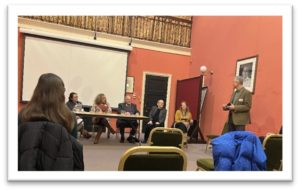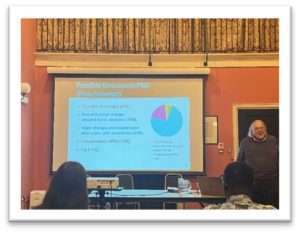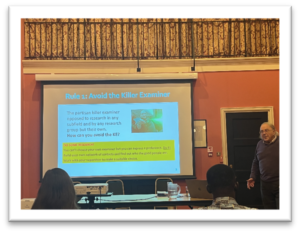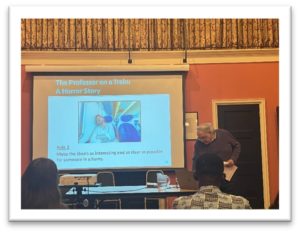post by Nasser Alkhulaifi (2021 cohort)
As an AI researcher deep into my PhD journey, I recently had the opportunity to attend the Forum for AI Research Students (FAIRS) at the University of Cambridge. This preliminary event to the AI-2024 SGAI International Conference offered invaluable insights into “How to be an effective AI researcher” and navigating the final stages of doctoral research. The FAIRS event was not just about preparing for a PhD viva – it was about understanding what it means to be an effective researcher in the dynamic field of AI. For fellow AI researchers, whether preparing for their viva or earlier in their journey, the key message is clear: success in research is not just about technical brilliance – it’s about effective communication, professional maturity, and the ability to place our work within the broader context of scientific advancement. Among the many inspiring sessions, Professor Max Bramer’s talk stood out for its depth and practical relevance, especially on navigating the often-daunting PhD thesis writing and viva preparation, which I will be reflecting on in this blog.

The Art of Choosing Your Examiner
Professor Bramer introduced Rule 1: “Avoid the Killer Examiner” – a partisan examiner who might be overly critical or biased against research outside their niche. While we can’t choose our examiners directly, we can express preferences. The key is building networks and working with supervisors to make suitable choices. The external examiner should be an expert in areas relating to yours, but not necessarily precisely your area, with good general knowledge potentially being more valuable than narrow expertise. Building a network of contacts to identify fair and constructive examiners is crucial. As he explained, “You are the leading expert in your area (temporarily)” and ensuring examiners respect diverse methodologies is key to a fair evaluation. This advice underscored the collaborative nature of academia and the importance of proactive preparation. As researchers, it is our responsibility to not only produce rigorous work but also anticipate the context in which it will be evaluated.
-
- The Examiner’s View: remember that the external examiners are usually busy academics fitting the viva into an already packed schedule. They have a short period to read the thesis, often just 2-3 days, and rely on their lifetime of experience to evaluate it. Professor Bramer pointed out that examiners want to see evidence of good research skills, a scientific approach, and a clear original contribution to knowledge. While it is not an attractive job – with a small fee and significant responsibility – most examiners aim to pass the candidate as long as they are confident in the work.
- The Student’s View: From the student’s perspective, the viva can feel like the ultimate test – the culmination of years of hard work, false starts, and countless drafts. Professor Bramer reassured us that the viva is not like a traditional university exam. Instead, it’s a discussion about a substantial project, captured in a thesis that is typically 200-300 pages.
The Professor on a Train!
It’s our job as authors to “make the thesis as interesting and clear as possible for someone in a hurry” which is Rule 2 in prof Bramer’s talk. “Think of a busy professor reading your thesis on a train,” Professor Bramer warned. This hypothetical professor, juggling a packed schedule, won’t have time/patience for convoluted writing or unclear arguments. So, start with a killer Chapter 1 because first impressions matter! This chapter gives examiners everything they need to know upfront. Also, throughout the thesis, signpost clearly and use repetition to reinforce key points. As Professor Bramer said, “Repetition and redundancy are helpful”. The takeaway? Respect your reader. A well-written thesis not only communicates your research but also demonstrates professionalism and attention to detail. And let’s not forget the basics: good grammar, proper punctuation, and consistent formatting. Small details make a big impression.
Your Thesis is Your Only Evidence!
Remember that your thesis is the sole evidence of years of research work. “A well-written thesis is essential. A badly written one can be ruinous” he stated. This was not just about writing quality – it was about allowing sufficient time for the iterative process of drafting, reviewing, and refining. A compelling thesis not only captures the attention of examiners but also builds their confidence in the candidate’s work. Key tips included:
- Chapter 1 as a Mini-Thesis: The introduction/first chapter should summarise the entire work succinctly, making it accessible even to readers in a hurry – remember Rule 2!
- Signposting and Repetition: Clear structure and strategic repetition help readers navigate the document effectively.
- Clarity and Consistency: Technical writing is an iterative process, and allowing ample time for revisions is essential. Supervisors play a pivotal role here, and it is important to ensure they have sufficient time to critique drafts thoroughly.

Preparing for the Viva – Rule 3: “Make the External Examiner Confident Enough to Pass You”
The viva is a chance to reassure the examiners that you fully understand your work and the research process. It is not a test of survival but rather a professional discussion aimed at validating years of dedication. Examiners want to pass you – it is your job to make that decision as easy as possible for them. Prof Bramer provided practical strategies to navigate this critical stage:
-
- Confidence through Preparation: Anticipate common questions such as, “What is the original contribution to knowledge?” and “What are the limitations of your approach?” Rehearse answers to ensure clarity and coherence.
- Contextual Understanding: Demonstrate an ability to situate your work within the broader field. “Why is your approach significant?” and “How does it compare to the related literature?” This breadth of understanding reassures examiners of your expertise. Show that you can situate your work within the broader field (see Rule 6).
What to Avoid – Rule 4: “Do Not Defend the Indefensible”
Prof Bramer also shared horror stories and pitfalls that candidates should avoid. From making unsubstantiated claims to failing to credit sources properly, these cautionary tales served as reminders of the standards required in academic research. He shared a few cautionary tales of candidates who undermined their credibility by defending indefensible positions. One claimed their algorithm was “1000 times faster” than a benchmark without providing any sufficient supporting data. Misleading claims, such as “No one else has ever worked on this” can undermine credibility. Bramer’s advice was clear: avoid careless blunders, maintain scientific integrity, and always substantiate claims. The lesson? Be realistic and honest. Modest, well-supported claims will always be more persuasive than exaggerated or unsupported ones.
What to Avoid – Rule 5: “Do Not Claim Too Much”
This ties into Rule 4 but deserves its own focus – avoid overclaims! Modesty and accuracy are key. Rather than overstating the impact of your work, provide substantiated claims supported by evidence! Prof Bramer emphasised that your thesis does not need to solve all the world’s problems because nobody does! Examiners are looking for a solid, original contribution to knowledge – not a miracle breakthrough! So, focus on what you’ve achieved, and be clear about its limitations.

Rule 6: “Context Matters”
Examiners expect you to understand where your work fits within the broader research landscape. Be ready to answer questions such as “Why did you choose this approach?”, “In what ways does it differ from or resemble alternative methods?”, “What is the significance of your contribution or the new scientific understanding of your research?” Demonstrating this broader awareness will reassure examiners that you’re a well-rounded researcher with a good grasp of the field.
Final Thoughts
Professor Bramer’s talk was a refreshing mix of practical advice and candid insights. Writing a thesis and defending it in a viva might seem daunting, but with preparation, scientific integrity, and a clear structure, it’s absolutely achievable. And remember, your examiners want to pass you!




